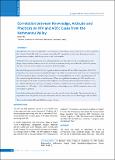Please use this identifier to cite or link to this item:
https://hdl.handle.net/20.500.14356/1785Full metadata record
| DC Field | Value | Language |
|---|---|---|
| dc.contributor.author | Karki, T B | - |
| dc.date.accessioned | 2023-05-22T09:50:45Z | - |
| dc.date.available | 2023-05-22T09:50:45Z | - |
| dc.date.issued | 2014 | - |
| dc.identifier.citation | KarkiT. B. (2014). Correlation between Knowledge, Attitude and Practices on HIV and AIDS: Cases from the Kathmandu Valley. Journal of Nepal Health Research Council. https://doi.org/10.33314/jnhrc.v0i0.431 | en_US |
| dc.identifier.issn | Print ISSN: 1727-5482; Online ISSN: 1999-6217 | - |
| dc.identifier.uri | http://103.69.126.140:8080/handle/20.500.14356/1785 | - |
| dc.description | Original Article | en_US |
| dc.description.abstract | Abstract Background: This study investigated the correlation between knowledge, attitude and practices on HIV and AIDS in the context of Nepal.The study was conducted among the 404 respondents; selected from the transport workers, garment factory workers, brick factory workers and health workers. Methods: It was non-experimental cross sectional study based on descriptive as well as correlational research design. Simple random technique was used to select the respondents. Survey was conducted to collect the primary data and r value was used to analyze the correlation between variables. Results: Finding shows that 391 (96.8%) respondents have heard about HIV and AIDS; among them 388 (95.8%) respondents were mentioned that they had knowledge of way of HIV transmission also. Total 50 out of 171 unmarried (29.2%) respondents had pre-marital sexual experience. It was found that only 71 (25.6%) respondents had used the condom during their first time sexual intercourse.There was significant association (p=.000) found between the knowledge on way of HIV transmission and occupation of respondents, similarly relationship found (r = .815, p = .000 (2-tailed) between marriage age and age of first time sexual intercourseof respondents. But there was no relationship (r = .097 and p =.106 (2-tailed) found between Knowledge on way of HIV transmission and sex with non-regular sex partners. Conclusions: Data showed that safer sex practices was low than the level of knowledge. The educational status of respondents shows the positive association with attitude towards the necessary to have knowledge of HIV and AIDS. Â Keywords: Attitude; HIV and AIDS; Knowledge; Practices. | en_US |
| dc.language.iso | en | en_US |
| dc.publisher | Nepal Health Research Council | en_US |
| dc.relation.ispartofseries | Jan-April, 2014;431 | - |
| dc.subject | Attitude | en_US |
| dc.subject | HIV and AIDS | en_US |
| dc.subject | Knowledge | en_US |
| dc.subject | Practices | en_US |
| dc.title | Correlation between Knowledge, Attitude and Practices on HIV and AIDS: Cases from the Kathmandu Valley | en_US |
| dc.type | Journal Article | en_US |
| local.journal.category | Original Article | - |
| Appears in Collections: | Vol. 12 No. 1 Issue 26 Jan - Apr, 2014 | |
Files in This Item:
| File | Description | Size | Format | |
|---|---|---|---|---|
| 431-Article Text-578-1-10-20140709.pdf | Fulltext Download | 200.94 kB | Adobe PDF |  View/Open |
Items in DSpace are protected by copyright, with all rights reserved, unless otherwise indicated.
